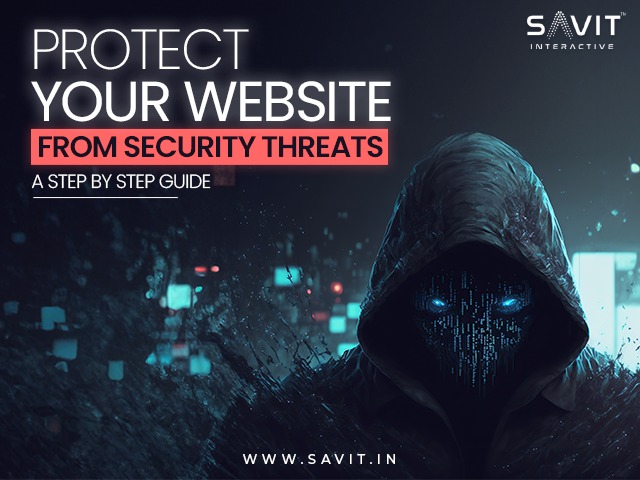Businesses communicate with their clients either online or through social media in the era of the world economy’s rapid digital transformation. Users can examine all recent changes, purchase goods or services, get in touch with the company’s representatives, and more by visiting the company website.
The company suffers substantial reputational and financial damages when its website is offline and dishonest competitors and unscrupulous agents are aware of it. Hackers target corporate websites in order to extract ransom payments or to hurt competing companies. That is why “how to protect websites from hackers” is one of businesses’ most frequently asked topics to cybersecurity specialists.
This Blog informs you of the dangers posed by compromised websites in this content and precautions to protect Your website from hackers.
11 Most Effective Tips for Securing Websites from Hackers
Every organisation is aware that cyberattacks pose a significant digital danger to its operations. However, many firms do not, implement the required security measures to protect their websites from hackers.
1.Install plugins for SSL and security
One of the primary security procedures to secure websites from getting hacked is the installation of SSL and security plugins. As it will be encrypted, only the intended recipients will be able to access the information provided by your website.
2.Install the most recent security software
The installation of the most latest security software should always be checked by website owner. This advice is especially crucial for website owners utilising CMS-like WordPress sites with numerous plugins. In order to handle emerging risks and protect websites from hackers, updates include specialised security patches and features.
3.Use a Secure Password
Verify that you are using a secure password. A strong password must be untraceable and have unusual characters, digits, and letters. You shouldn’t utilise frequent word or phrase combinations or dates that could be connected to your life story or area of expertise.
4.Use the HTTP protocol
HTTPS is encrypted to improve data transfer security when users communicate sensitive data; this is very crucial.
5. Avoid Following Instructions in Suspicious Emails
It is best to refrain from carrying out the instructions provided in dubious emails or messages, as these communications could be part of a phishing effort.
6. Limit the Information Users Upload to Websites
If you want people to be able to upload files, you should indicate which extensions are permitted, as well as the file’s maximum permissible size. Don’t forget to scan the uploaded files because they can also be infected with malware. In order to prevent a website’s functionality and the security of its data from being harmed, even if submitted files include malware, they should be kept apart from the main folder.
7. Employ website security software
To determine whether your website is susceptible to attacks, use specialized website security technologies that simulate hacker attacks. Understanding what is website security and how to prevent it is imperative. One of the most effective ways to take action in this area is to use firewalls to prevent hackers from accessing websites.
8. Protect Your Website
Keep a backup of your website. In the event that it is hacked, you will be able to recover all the data and get the website back to working properly.
9. Opt for Reputable Web Hosting Companies
Choose trustworthy web hosts that regularly do backups and scan logs for activity from known malicious actors. In the event of a cyberattack, the accountable service provider will work with you right away to filter traffic. It could be prudent to examine the pattern of security occurrences involving a host.
10. Use only the necessary plugins
Use the plugins that are properly maintained and that you actually require for your activities. You should refrain from utilising a plugin if it hasn’t been updated in years or has known security flaws.
11. Pass recurring security assessments
Request security testing, such as penetration testing, from reliable vendors. In order to fix the current vulnerabilities and stop the creation of similar problems in the future, security engineers will test your web environment’s resistance to cyberattacks. They will provide you with suggestions on how to make security improvements. The ability to manually and methodically assess a system to determine the client’s ability to prevent website hacking is made possible by this form of security assessment.
12. Risks connected to website-targeting cyberattacks
Customers’ sensitive information could end up on the dark web if a business doesn’t safeguard its website from hackers and viruses. In this scenario, a business is likely to lose the compromised clients permanently.
Some businesses may hold intellectual property on their websites, such as vendor and customer portals, confidential company records, etc. Failure to protect a firm’s website from hackers may result in commercial failure and reputational damage since clients and business partners may file several lawsuits against the company.
Hackers may use the company’s website as a launchpad for assaults on other companies once the website has been compromised. In recent years, hackers have aggressively mined bitcoins using the bandwidth of hacked websites. In this scenario, law enforcement authorities might identify your web server as the source of the cyberattacks, which could subject your business to legal repercussions as well as significant time and money costs.
Malicious actors might utilize a company’s resources to practise their skills and novel exploitation techniques in a real-world setting when they fail to implement sufficient security measures to guard against website hacking. In this instance, hackers’ actions are unpredictable, and it can take a while to repair the harm these inexperienced hackers caused to corporate websites.
Malicious actors can implant malicious content into corporate web resources to reroute traffic when firms do not pay enough attention to protecting their websites from hackers. Sometimes, rivals may use these tactics to damage their competitors’ reputations and financial standing.
Conclusion
One of the significant cybersecurity concerns confronting businesses from diverse industries is website hacking. The inability of a company to safeguard its website against viruses and hackers may have adverse financial, reputational, and technical repercussions for this industry participant and, generally, damage its long-term competitiveness. Websites can be compromised using a variety of techniques and technologies. Therefore, businesses that place a high priority on protecting their websites from hackers should be aware that, without expert security providers, they risk underestimating the security of their web resources.
There are general guidelines that businesses may adhere to considerably reduce the danger of hacking their websites. With Savit Interactive’s Web hosting service, get unique security solutions for your company’s website and protect it from risks. Generally speaking, businesses that work to protect their websites from hackers should understand that investing in creating security is one of the most sane moves that will improve their reputation, competitiveness, and profitability.



